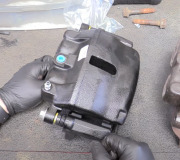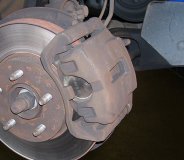Do you mean temporarily, or will the noise come back?
I see you lubed the backs of the pads where they contact the piston and caliper's fingers. Another place that needs lube is where the pads sit on their mounting surfaces. Lube on those points is more to reduce wear than to prevent noise, but if the rotor becomes just slightly warped, as most new ones do once, that makes the caliper and pads walk back and forth a little once per wheel revolution. If grooves wear into the pads' mounting surfaces, they can make a clicking noise when the brakes are applied. The pads are held tightly against one surface as they shift left and right a little and go into and out of those grooves.
When those grooves aren't worn in yet, a low growl can occur during braking.
One clue to look for is how the squeal occurs. The first thing I thought of was a worn rubber bushing. That can make a horrendous squeak, but only while the front of the vehicle is in motion moving downward, just at the start of the braking cycle. After that, the noise will only occur some more if the tire hits a bump or pothole. During a long stop, the squeak will only occur at the start of braking.
If the squeak remains constant as long as the vehicle is still moving, it has to be caused by something that is rotating. The frustrating part is that noise can be much too low to hear directly, but if it gets transmitted into the caliper, that mass can really amplify it to the point it's very easy to hear. That's actually why we put special high-temperature brake grease on the backs of pads. Disc brake pads a going to vibrate, period. There's nothing we can do to stop that. The grease allows the pads to vibrate, or slide back and forth against the piston and caliper fingers without transmitting the noise into the caliper.
A problem every brake system specialist has run into more than once is a bent backing plate, or splash shield. It should have a good 1/8" clearance from the edge of the rotor. If that clearance is too small, it can cause a noise only during braking due to the number of different forces acting on the caliper, rotor, and wheel bearing. You'd find this pretty quickly with the Chassis Ear. Sometimes there's a telltale shiny ring worn onto the backside of the rotor where it was touching the splash shield, but we usually see that only after the actual cause is found.
Another clue that points to a suspension bushing is the noise seems to always disappear for a few days right after any brake service is performed. The only thing that occurs consistently is that corner of the vehicle has to be jacked up, allowing the suspension to hang down and stretch the bushings. Same is true of ball joints. The extended travel redistributes the grease, making the squeaking go away for a while. A squeaking ball joint will occur at the same times as a rubber bushing would squeak. You can eliminate those as suspects if the noise is constant during braking.
A creaking noise that threw me for a loop a few years ago was caused by a stamped metal wheel cover. It could be heard occurring very lightly while walking slowly alongside the moving car, but the driver couldn't hear it until braking occurred. That put more weight on the front wheels, and the braking forces caused the wheel to flex more than normal. A very light film of axle grease around the wheel on the wheel cover contact points solved that. The creaking sounded exactly like a worn rubber bushing, except it was constant during braking until the car stopped moving.
The last thing I can think of used to effect mostly GM front-wheel-drive cars, but it could apply to any brand. Typically, right after a normal front brake job, a grinding noise would develop, but mainly while turning, and not so much from braking. It was found the rotors were flexing under the wheel and lug nuts, even though everything was fine and the lug nuts were torqued to specs. The noise was solved by placing a light coating of axle grease on the hub where the center hole of the rotor sits. That allowed the flexing to occur without creating that grinding or crunching noise. Now it's standard practice to put a little lube on the hub whenever the rotor is reinstalled. I like to use Spray White Lube. That's a lithium-based grease, but be careful to not allow any overspray to get on the rotor's or pads' friction surfaces. I consider this more of a preventive maintenance for the one out of a hundred vehicles that might develop that noise.
Sunday, October 20th, 2024 AT 7:34 PM




